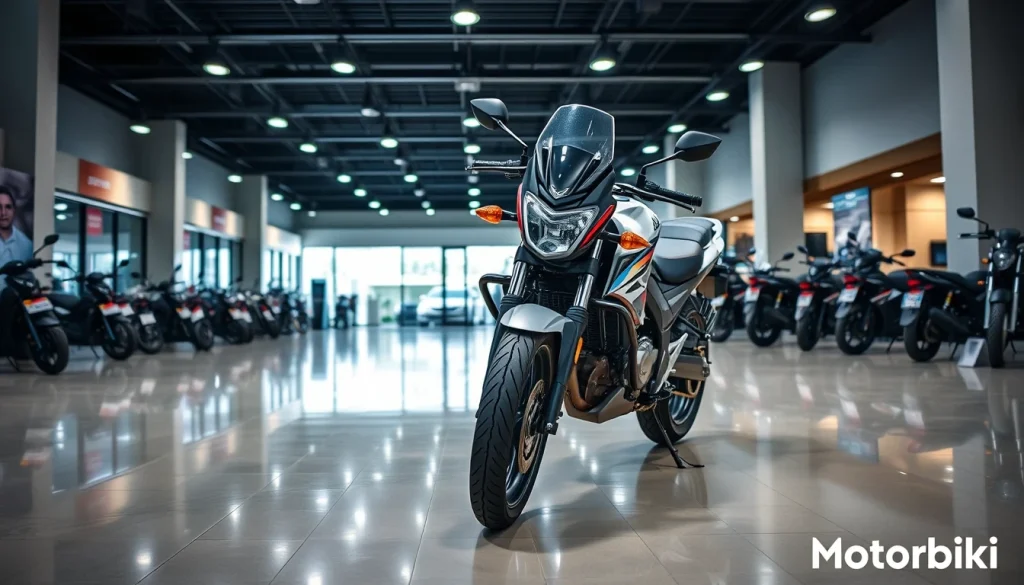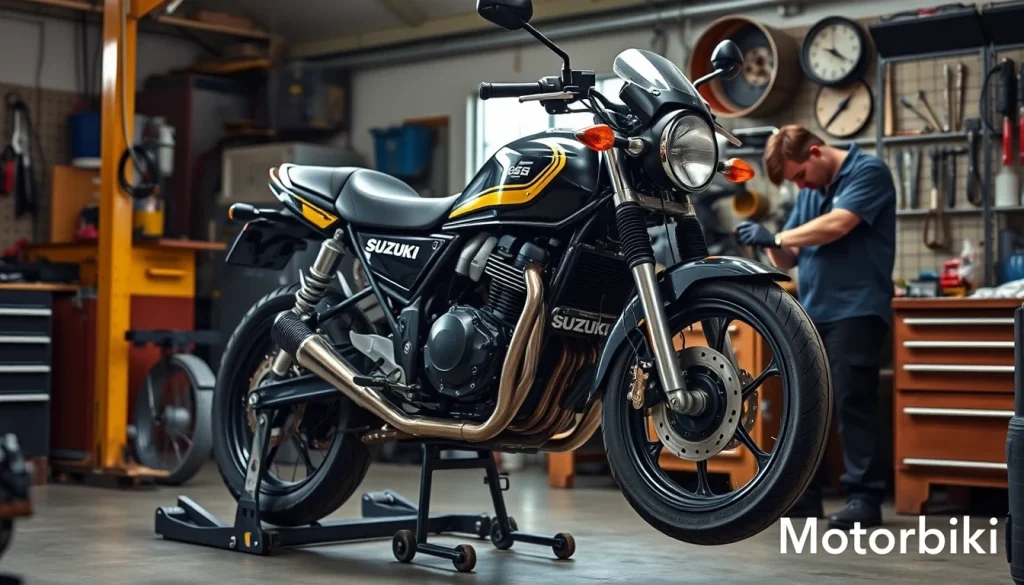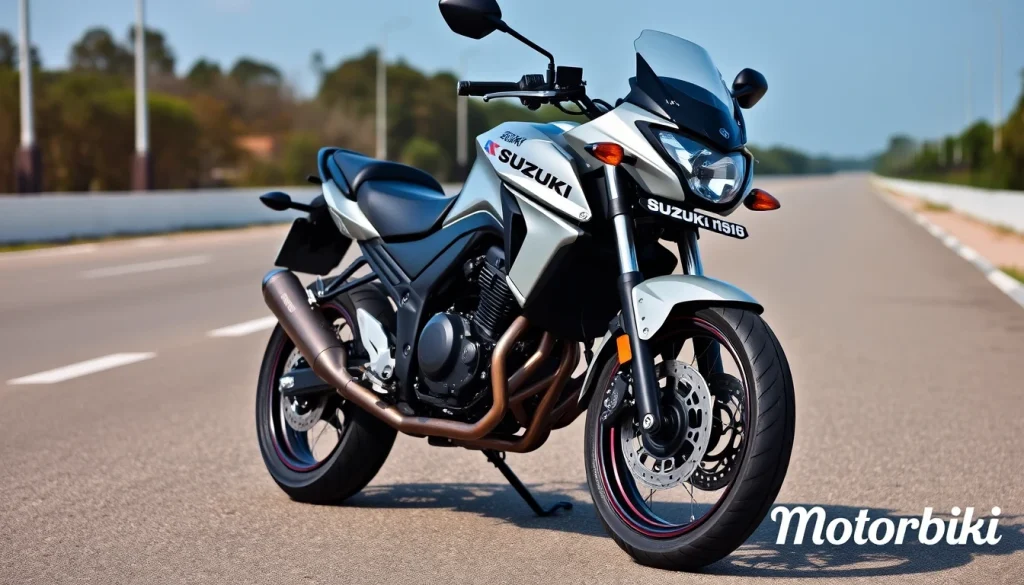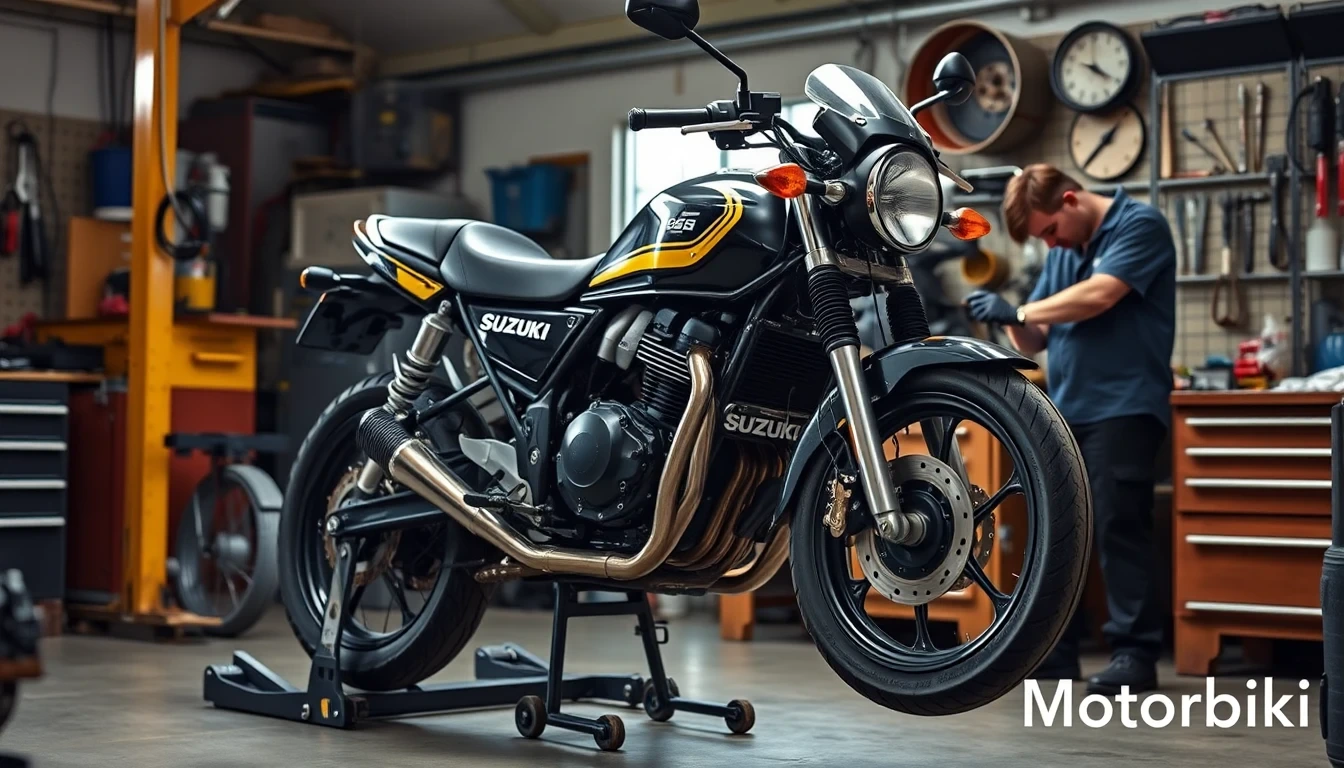7 Top Suzuki GS150 Problems and Complete Fixes Every Rider Should Know
Introduction
The Suzuki GS150 is a reliable motorcycle, well-known among daily riders and long-distance travelers. However, like any machine, it faces some recurring issues that affect performance and rider experience. This article explores the most common Suzuki GS150 problems along with their causes and solutions, providing step-by-step guidance to keep your motorcycle running smoothly.

Suzuki GS150 Problems Gear Shifting Fix
This is a very important and common problem that riders complain about a lot, especially when they experience a breakdown during changing weather or while traveling on a rough road.
The main causes for this problem are as follows:
According to the rider’s complaint, there are several reasons why this problem may occur.
Cause 1: Worn-Out Clutch Plates
When clutch plates wear out, they fail to transfer power properly. This leads to difficulty in changing gears, especially at higher speeds.
Cause 2: Poor Clutch Cable Adjustment
A wrongly adjusted clutch cable, either too loose or too tight, prevents proper disengagement, making gear shifting rough.
Cause 3: Low or Dirty Engine Oil
Contaminated or insufficient oil increases friction in the gearbox, causing stiffness and false neutral positions.
Cause 4: Damaged Gearbox Components
Worn selector forks or gear teeth can lead to missed shifts and gearbox noise.
Cause 5: Aggressive Riding Habits
Frequent clutchless shifting or rough riding damages the gearbox, leading to long-term gear issues.
The main solutions to this problem are as follows:
With the help of a professional mechanic and expert, you have been given some important instructions, by following which you can avoid this problem and also find its proper solution.
Solution 1: Replace Worn Clutch Plates
New clutch plates restore smooth shifting and reliable power delivery. Lubricate all its parts properly and with a good lubricating oil; this will also eliminate this problem.
Solution 2: Adjust the Clutch Cable
Proper adjustment ensures easy clutch disengagement and accurate gear shifts. Have a professional mechanic tighten the wire properly, making sure it is neither too loose nor too tight. This will also solve this problem.
Solution 3: Use Fresh Engine Oil
Changing oil at regular intervals reduces gearbox stress and makes shifting smoother. Use the same engine oil as directed by the motorcycle company and buy that motorcycle oil from a shop designated by the motorcycle company.
Solution 4: Repair Gearbox Components
Replacing worn parts like selector forks prevents further damage to the gearbox. The clutch and all motorcycle parts connected to it that have a direct or indirect connection with the clutch should be properly adjusted and properly lubricated so that they do not put extra weight on the clutch.
Solution 5: Improve Riding Habits
Smooth shifting with proper clutch use increases gearbox lifespan. When changing gears, press the clutch properly and only then change the gear. This also eliminates the clutch problem.
How to Fix Battery Drain on Suzuki GS150
The battery problem is a problem that every Rider described. This problem occurs with every rider, no matter what the vehicle is, no matter how expensive or cheap it is. A battery problem can occur in every vehicle. There are many reasons for this.
The main causes for this problem are as follows:
There are many reasons why a motorcycle battery can fail, including climate change or an accident. The rest are listed below.
Cause 1: Faulty Regulator/Rectifier
A defective regulator cannot control voltage properly, causing the battery to discharge quickly.
Cause 2: Weak Alternator Output
If the alternator fails to generate enough power, the battery drains even while riding.
Cause 3: Wiring Short Circuits
Damaged or loose wires create parasitic drain, reducing battery life.
Cause 4: Old or Weak Battery
Over time, batteries lose their capacity, leading to frequent discharges.
Cause 5: Excess Electrical Accessories
Too many add-ons, like extra lights, can overload the charging system.
You can solve this by following the instructions below:
A professional mechanic and expert gave some important instructions for battery problems. With the help of a professional mechanic and an expert, we are telling you the following solutions.
Solution 1: Replace the Regulator/Rectifier
Installing a new unit ensures stable voltage regulation. If the regulator is not usable after repair, it is better to get it changed and use a good, quality regulator instead.
Solution 2: Service the Alternator
A properly working alternator charges the battery efficiently. Do not charge the battery with only one charger. Use an alternative charger, as this will also improve battery usage.
Solution 3: Inspect and Repair Wiring
Fixing shorts and tightening connections prevents unnecessary drain. The more durable and strong the wiring system, the longer the battery will last and give better results. If the wiring system is damaged, repair it properly.
Solution 4: Install a New Battery
Replacing an old, weak battery restores reliable performance. A repairable battery is not reliable. It is better to use a good, quality battery instead, which is long-lasting and also maintains a better current supply.
Solution 5: Limit Extra Accessories
Avoiding low-quality accessories prevents overloading the system. Remove any extra items on your motorcycle that put extra strain on the battery immediately so that the battery can last longer.
Suzuki GS150 Chain Noise Solution
Noise is a common problem that can occur for any reason, such as something breaking on the bike, a loose part, or a loose chain.
The main Causes for this problem are as follows:
The problem of noise is a common one, but it can seriously affect the performance of the motorcycle and the rider. It is usually caused by loose or broken parts in the motorcycle.
Cause 1: Loose Chain Tension
A chain that is too loose rattles and makes continuous noise.
Cause 2: Worn-Out Sprockets
Damaged sprocket teeth cause uneven chain movement and vibration.
Cause 3: Dry or Unlubricated Chain
A chain without lubrication rubs harshly, creating metallic noise.
Cause 4: Misaligned Rear Wheel
Improper alignment forces the chain to run unevenly, producing sound.
Cause 5: Chain Wear and Stretch
An old chain becomes stretched, making it noisy and unstable.
You can avoid this Suzuki GS150 Problems by following the instructions below:
After consulting a professional mechanic and expert, some important guidelines have been given, by following which you can avoid this problem and prevent it from recurring.
Solution 1: Adjust Chain Tension
Keeping the chain within factory tension reduces noise. Adjust the motorcycle chain properly, tighten it properly, and lubricate it well so that it does not make noise.
Solution 2: Replace Damaged Sprockets
New sprockets ensure smooth chain engagement. Remove the damaged parts from the chain and replace them with good, quality, lubricated parts. This will eliminate this problem.
Solution 3: Regularly Lubricate the Chain
Lubrication prevents friction and keeps the ride silent. Lubricate the chain thoroughly after a long journey or after a change in weather, such as rain or excessive sun, or after traveling on a rough road. This will also eliminate the noise problem.
Solution 4: Align the Rear Wheel
Correct wheel alignment ensures balanced chain rotation. The better the wheel alignment, the better the performance of the chain. If the wheel alignment is not good, the performance of the chain does not improve.
Solution 5: Install a New Chain
A fresh chain eliminates vibration and extends riding comfort. If the problem with the chain does not go away even after lubricating it, tightening it properly, removing its joints, or increasing or decreasing its tension, then replace it with a good and quality chain, even if it is new.

Suzuki GS150 Overheating Issue
The problem of motorcycle overheating is very complex and very old. Almost every rider has complained about it after some time.
The main Causes for this problem are as follows:
Cause 1: Poor Quality Engine Oil
Low-grade oil fails to reduce engine heat properly.
Cause 2: Clogged Cooling Fins
Dust and dirt block airflow, preventing proper cooling.
Cause 3: Incorrect Carburetor Tuning
A lean fuel mixture makes the engine run hotter than normal.
Cause 4: Continuous Over-Revving
Riding at high RPM for long periods increases engine temperature.
Cause 5: Overloaded Riding Conditions
Carrying extra weight forces the engine to overwork, generating excess heat.
The main solutions to this problem are as follows:
When I spoke to some engine experts and propulsion mechanics, they gave me some important instructions for its prevention, which are described below.
Solution 1: Use High-Quality Engine Oil
Premium oil controls friction and heat effectively. It should be of Engine standard and designated by the company; this will eliminate the problem of heating, and it should be changed according to the proper method and time.
Solution 2: Clean Cooling Fins
Regular cleaning ensures proper airflow for cooling. The cooling fan should be checked properly. If there is a problem with this video, it should be fixed immediately. The more the cooling fan works, the less the overheating problem will be.
Solution 3: Adjust Carburetor Settings
A correct fuel-air mixture maintains normal engine temperature. The better the carburetor settings, the better the oil filter will be.
Solution 4: Avoid Over-Revving
Riding at moderate RPM helps in temperature control. Driving memory should be improved on rough roads, and speed should be avoided.
Solution 5: Reduce Overloading
Carrying the recommended weight prevents overheating stress.
Suzuki GS150 Poor Acceleration Problem
Acceleration problems are another very important problem that severely affects the performance of both the rider and the motorcycle, and requires a lot of effort to repair.
The main Causes for this Suzuki GS150 Problems are as follows:
There are many reasons for this problem, some of which are mentioned below. This problem arises due to all these reasons.
Cause 1: Clogged Air Filter
A dirty air filter restricts airflow, reducing power output.
Cause 2: Blocked Carburetor Jets
Fuel flow problems cause sluggish throttle response.
Cause 3: Weak Ignition Timing
Incorrect spark timing lowers acceleration efficiency.
Cause 4: Worn Piston Rings
Loss of compression reduces engine performance.
Cause 5: Poor Fuel Quality
Contaminated fuel decreases combustion power.
The main solutions to this problem are as follows:
Responding to the complaints of many riders, some experts have given some important instructions about this, by following which you can get rid of this problem.
Solution 1: Replace the Air Filter
A clean filter restores airflow and improves power. Change the air filter within the specified time. The air filter should be good and of good quality, which is used for all types of filtration, and this also increases its efficiency.
Solution 2: Service the Carburetor
Properly cleaned jets allow smooth fuel delivery. Get your carburetor serviced by a proper and professional mechanic within the specified time frame, or after a long period of time, or after an accident, or a weather change. This will also eliminate this problem.
Solution 3: Adjust Ignition Timing
Correct spark timing ensures strong acceleration. Take care of the Ignition Timing. Always get it serviced by a professional mechanic or a shop designated by the company. This will further improve the performance of the motorcycle and eliminate this problem.
Solution 4: Replace Piston Rings
New rings restore compression and engine strength. Motorcycle paintballs should always be repaired by a professional mechanic. If they are damaged, replace them with good-quality paintballs that are durable and can withstand all kinds of pressure, as they are repairable, not reliable.
Solution 5: Use High-Quality Fuel
Clean fuel improves combustion and power output.
Why Is My Suzuki GS150 Clutch Slipping?
Clutch slipping is a very common problem, but it causes great damage to the performance of the motorcycle, and its performance is badly affected because the running of the motorcycle depends on the clutch. If the clutch slips, the motorcycle cannot kick on or off.
The main Causes for this problem are as follows:
There are many important reasons for this problem, due to which it bothers the rider to a great extent and also affects the performance of the bike.
Cause 1: Worn Clutch Plates
Old plates lose grip, leading to slipping.
Cause 2: Weak Clutch Springs
Springs that lose tension cannot hold the clutch tightly.
Cause 3: Over-Adjusted Clutch Cable
Too much adjustment prevents full clutch engagement.
Cause 4: Poor Engine Oil Choice
Low-quality oil causes clutch glazing and slipping.
Cause 5: Continuous Overheating
Excess heat damages clutch parts, causing slip.
The main solutions to this problem are as follows:
In response to complaints from some riders, some leading experts have provided some important instructions, following which you can easily resolve this problem.
Solution 1: Replace Worn Plates
New plates ensure proper clutch performance. If the clutch is slipping repeatedly and the problem is still occurring even after fixing the valve, then replace the clutch plate because it is damaged. Replacing the clutch plate will eliminate this problem.
Solution 2: Install Stronger Springs
Upgraded springs improve clutch grip. Tighten the clutch spring properly. If it is not tightening properly, remove it and use a good, quality spring in its place. This will also solve this problem.
Solution 3: Adjust the Clutch Cable Properly
Correct adjustment eliminates unnecessary slipping. Fix the clutch wire properly and lubricate it well. If the problem persists, use a good, quality wire so that it is durable and provides support for the clutch.
Solution 4: Use the Right Engine Oil
Approved oil prevents glazing and slippage. A good and quality engineer will use it to lubricate it properly and make it easier to work.
Solution 5: Control Overheating
Managing engine temperature protects clutch health. The safer you are from motorcycles and heating, the more this problem will be reduced.
Suzuki GS150 Brake Problems
Brakes are a very important part of a motorcycle. Its damage poses a threat to the lives of both the motorcycle and the rider. The damage during prolonged driving can cause a major accident on the motorcycle and can even kill the rider.
The main Causes for this problem are as follows:
There are many reasons why motorcycle brakes fail, most of which are due to an inexperienced rider, excessive use, weather changes, or an accident.
Cause 1: Worn Brake Shoes or Pads
Thin pads reduce stopping power and increase distance.
Cause 2: Glazed Brake Drums
A smooth surface lowers friction and weakens braking.
Cause 3: Weak Brake Cables
Loose or stretched cables delay brake response.
Cause 4: Oil or Dust Contamination
Foreign particles inside the drum reduce grip.
Cause 5: Poor Maintenance
Ignoring regular servicing weakens braking performance.
The main solutions to this problem are as follows:
Professional motorcycle mechanics and other experts are sharing many tips to prevent brake problems, which can be followed to avoid them.
Solution 1: Replace Brake Shoes or Pads
Fresh parts restore reliable braking force. If the brake problem persists despite proper tightening, replace the shoes and pads and use good-quality pads that are durable and can withstand all types of pressure.
Solution 2: Recondition Brake Drums
Sanding or replacing drums improves friction. Lubricate the brake parts thoroughly to protect them from friction. This will also eliminate this problem and prevent it from happening again.
Solution 3: Tighten or Replace Cables
Healthy cables provide quick and strong braking. Tighten the clutch cable properly and lubricate it well. If the problem persists, remove the clutch cable and replace it.
Solution 4: Clean Drum and Brake Area
Removing oil and dust restores full braking efficiency. Always have it serviced regularly by a good and professional mechanic and have it checked properly.
Solution 5: Schedule Regular Maintenance
Consistent service ensures long-lasting brakes.
Suzuki GS150 Brake Maintenance Schedule
| Maintenance Task | Recommended Interval | Notes |
| Inspect Brake Shoes / Pads | Every 1,000 km | Check for wear and replace if the thickness is below the limit |
| Adjust Brake Free Play | Every 1,000 km | Ensure proper lever response and smooth braking |
| Clean Brake Drum / Disc | Every 2,000 km | Remove dust, dirt, and oil for a better grip |
| Replace Brake Shoes / Pads | Every 6,000–8,000 km | Use genuine Suzuki parts for safety |
| Inspect Brake Cables & Levers | Every 3,000 km | Lubricate and replace if stretched or weak |
| Full Brake System Service | Every 12 months | Complete inspection for long-term reliability |
Frequently Asked Questions (FAQs) About the Suzuki GS150 Problems
How often should I service my Suzuki GS150?
It is recommended to service the Suzuki GS150 every 2,000–2,500 km. A full inspection, including oil change, brake check, and chain adjustment, ensures smooth performance and longer engine life.
Which engine oil is best for the Suzuki GS150?
High-quality 10W-40 motorcycle engine oil is ideal for the GS150. Always use oil that meets API SL or JASO MA standards for better lubrication and cooling.
Why does my Suzuki GS150 make chain noise?
Chain noise usually happens due to loose tension, lack of lubrication, or worn sprockets. Regular adjustment and lubrication help reduce noise and extend chain life.
How can I improve the mileage of my Suzuki GS150?
To improve mileage, always keep the air filter clean, maintain correct tire pressure, and ride at moderate speeds. Regular servicing also plays a big role in fuel efficiency.
What is the top speed of the Suzuki GS150?
The Suzuki GS150 can reach a top speed of around 100–110 km/h, depending on road conditions, rider weight, and maintenance status.
Why is my Suzuki GS150 overheating?
Overheating can be caused by low-quality oil, blocked cooling fins, or incorrect carburetor tuning. Regular maintenance and high-quality oil help control engine temperature.
Suzuki GS150 Complete Specifications
| Category | Specification |
| Engine Type | 4-Stroke, Single Cylinder, Air-Cooled, OHC |
| Displacement | 150 cc |
| Bore x Stroke | 57.0 mm × 56.8 mm |
| Compression Ratio | 9.2: 1 |
| Maximum Power | 12 HP @ 8,500 RPM |
| Maximum Torque | 12 Nm @ 6,000 RPM |
| Starter System | Electric & Kick Start |
| Ignition System | CDI (Capacitor Discharge Ignition) |
| Transmission | 5-Speed Constant Mesh |
| Frame Type | Backbone Frame |
| Front Suspension | Telescopic, Coil Spring, Oil Damped |
| Rear Suspension | Swing Arm, Coil Spring, Oil Damped |
| Front Brake | Drum (Disc in SE variant) |
| Rear Brake | Drum |
| Tyres | Front: 2.75-18 – Rear: 3.00-18 |
| Wheelbase | 1,270 mm |
| Ground Clearance | 155 mm |
| Fuel Tank Capacity | 12 Liters |
| Dry Weight | 114 – 116 kg |
| Dimensions (L × W × H) | 1,890 × 785 × 1,120 mm |
| Seating Capacity | 2 Persons |
User Reviews and Feedback on Suzuki GS150
Many Suzuki GS150 riders have shared mixed experiences about the motorcycle. Most owners appreciate its strong engine performance and durability, especially for daily commuting and long-distance travel. They highlight that the bike delivers reliable mileage when maintained properly.
On the other hand, riders often point out recurring issues such as hard gear shifting, frequent chain noise, and weak brakes. Some owners also mention that the GS150 requires regular servicing and genuine spare parts to perform at its best.
Despite these concerns, many users agree that the Suzuki GS150 is a value-for-money motorcycle with a comfortable ride, good fuel economy, and simple mechanics that are easy to repair. With timely maintenance and proper care, it continues to serve as a dependable choice for riders across different countries.

Suzuki GS150 vs Competitors: Comparison
The Suzuki GS150 faces stiff competition from newer 150cc bikes in today’s market. Riders often compare it with models such as the Honda CB150F and the newer Honda CG150. While GS150 shines with its rugged reliability and simple maintenance, competitors offer more modern features, smoother ride quality, and updated safety tech. Below is a clear comparison of the strengths and weaknesses in real-world use.
Conclusion
The Suzuki GS150 is a dependable motorcycle, but like all bikes, it experiences common Suzuki GS150 problems that affect performance and rider safety. By understanding the causes and solutions of these issues, owners can extend the life of their Suzuki GS150, avoid costly repairs, and enjoy a smoother riding experience. Regular maintenance, timely replacements, and good riding habits remain the key to keeping this motorcycle in peak condition.







